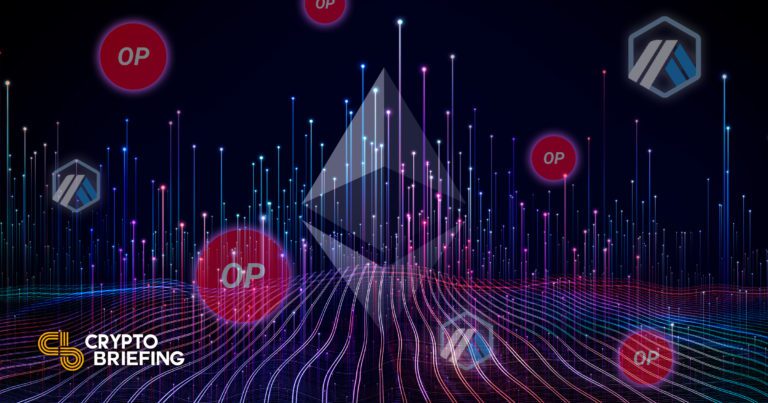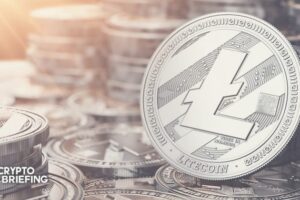
Key Takeaways
Layer 2 networks are spending more gas than ever settling transactions on Ethereum mainnet.
The Wednesday following Optimism’s token launch saw Layer 2 networks use a record-breaking 3.95% of the daily gas consumption on Ethereum.
Polygon’s co-founder Sandeep Nailwal suggested on Twitter today that Ethereum might eventually evolve into a network where Layer 2 transactions occupy the majority of its blockspace.
Share this article
With Layer 2 networks gaining significant traction in user activity, the gas fees Ethereum is raking in for renting its security are breaking record highs.
Ethereum Profits From Layer 2 Expansion
Layer 2 networks are spending record amounts of gas on Ethereum mainnet.
According to on-chain data from Dune, Layer 2 networks are now spending more gas than ever to settle or prove transaction batches on Ethereum’s mainnet, with spending consistently surpassing 10 billion gas since the beginning on May.
Weekly Ethereum gas spent by Layer 2 networks: Source: @funnyking/Dune
For instance, the highest amount of gas ever used on the Ethereum mainnet to settle Layer 2 network transactions occurred this Wednesday—immediately after Optimism launched its OP governance token late Tuesday. Specifically, all Layer 2 networks combined spent around 3.95 billion of the total 100 billion daily gas limit on Ethereum, accounting for about 3.95% of the gas spent on the network that day. To put the growth rate into perspective, the total monthly gas spent by Layer 2 networks on Ethereum in May 2021 was around 5 billion, whereas in May this year, it was approximately 52 billion, marking over a tenfold increase in absolute gas usage terms.
When Ethereum traffic increases it accrues value to all ETH holders. This is because the base gas fees on Ethereum are burned, reducing the overall ETH supply and thus increasing the value of all remaining tokens. In this way Ethereum “profits” as Layer 2 networks use its blockspace to settle transactions more efficiently than can be done directly on mainnet.
Layer 2 is an umbrella term for blockchain scaling solutions that handle transactions on separate networks then send them back to Ethereum mainnet for settlement. For example, Optimism and Aribrum are Layer 2 networks based on a cryptographic technology known as Optimistic Rollups that bundle transactions together off-chain (on their separate networks) and then settle the bundles in a single transaction on the Ethereum mainnet to reduce its transaction load.
Unlike so-called sidechains like Polygon’s Matic blockchain, which have their own consensus mechanisms, Layer 2 networks take the transactional load off of Ethereum but borrow or inherit its security by ultimately settling their batches on mainnet. This leads to an interesting dynamic where Layer 2 transactions become increasingly cheaper for users, but mainnet transactions remain sufficiently expensive to pay for Ethereum’s considerable security expenditure.
Commenting on the surge in Layer 2 usage on Twitter today, Polygon co-founder Sandeep Nailwal speculated that over time, Ethereum might evolve from a user-focused to a network-focused chain where it primarily settles batched Layer 2 network transactions instead of individual, user-generated mainnet transactions. “As I also said before that #Ethereum is transitioning from a B2C(user to chain) business model to B2B(chain to chain) model,” he said, adding that eventually, “majority of the Eth’s gas would be used by L2 chains.”
Disclosure: At the time of writing, the author of this piece owned ETH and several other cryptocurrencies.
Share this article
The information on or accessed through this website is obtained from independent sources we believe to be accurate and reliable, but Decentral Media, Inc. makes no representation or warranty as to the timeliness, completeness, or accuracy of any information on or accessed through this website. Decentral Media, Inc. is not an investment advisor. We do not give personalized investment advice or other financial advice. The information on this website is subject to change without notice. Some or all of the information on this website may become outdated, or it may be or become incomplete or inaccurate. We may, but are not obligated to, update any outdated, incomplete, or inaccurate information.
You should never make an investment decision on an ICO, IEO, or other investment based on the information on this website, and you should never interpret or otherwise rely on any of the information on this website as investment advice. We strongly recommend that you consult a licensed investment advisor or other qualified financial professional if you are seeking investment advice on an ICO, IEO, or other investment. We do not accept compensation in any form for analyzing or reporting on any ICO, IEO, cryptocurrency, currency, tokenized sales, securities, or commodities.
See full terms and conditions.















